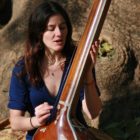
Workshop door Alicia Corral
Wanneer 8 juni 2019 + 9 juni 2019Deelname Early bird € 120,00 / 10th of May onwards € 150,00 (vegetarian lunch included) / For inscription, transfer € 50,00 to BE57 9731 5180 5135 with mention "Vedic chanting (your name)"
Locatie Vierlinden 1, 9940 Evergem
Vedic chanting is the traditional way of chanting the Veda’s (sacred books of Hinduism). It is a compendium of mantras in Sanskrit. According to Hindu tradition, these mantras were heard by the Rishis (great ancient yogis of India) in meditation, so the Vedic chants are considered sacred. They date about 1500 B.C. and were transmitted orally, in its original form, from master to disciple until today. Its correct pronunciation is essential, because in the Vedas it is said that the Vedic mantras have to be sung in a specific and concrete way so they can have a beneficial effect on us. In 2003 UNESCO recognized the Vedic chanting as a “masterpiece of the oral and intangible heritage of humanity”.
These are the Vedic mantras we are going to learn and practice:
Gāyatrīmantrah:
one of the main mantras of Hinduism, belonging to the Taittirīya Āraṇyaka (10.35.1), which honors the sun in its feminine form. It is sung so that the sun dissipates the darkness of ignorance and gives us clarity and strength.
Laghunyāsah:
from Taittirīya Brāhmaṇa, kāṭhaka (3.10.8.4), this mantra is known as a healing mantra. It asks different forces of nature to support different parts of our body.
Śivapañcākṣarīmantrah:
This mantra of Taittirīya Saṁhitā(4.5.18) is a chant in honor of Śiva. This mantra is composed of three parts (krama, jaṭāand ghana), one of the forms reciting Vedic chant.
Sūryanamaskāra-mantrah:
from Taittiriya Brahma, (7.3.6) it is sung for the sun, asking him the disturbances in us to disappear and to guide us in our actions. It is possible to use as support in the sequence of yoga called "Sun Salutation".
Āyurmantrah:
this mantra of Taittirīya Āraṇyaka (4.2.5), invokes the blessings of the bowels of the divine to obtain a long life, good health, clarity and stability.
We will learn how to pronounce some Vedic mantras in a very precise way with the traditional rules of Vedic Sanskrit pronunciation. We will observe the effects of the Sanskrit letters in our own body. The ancient science of Vedic chants is directed to affect the mind and the emotions of the person who is singing and also the listeners.Sanskrit is a language very rooted in the body. To pronounce some letters, you have to implicate your breath and abdomen more than in our western languages. It creates a strong connection between voice, sound and body.
We are going to prepare the body to sing the mantra, making it resonate in different centres and places in the body and make it vibrate with the sound of one’s voice.
We are going to use ancient words and mantras to find different ways of meditation and connection to oneself through sound.
Over Alicia Corral
Dr. Alicia Corral is a performer and researcher in the field of voice. She is a Vedic chant teacher certified by the S.K.Y. school of Chennai (India). She is trained in Indian vocal music in Dhrupad Sansthan of Bhopal (India) and in mantras and Vedic chants at the Krishnamacharya Yoga Mandiram of Chennai (India) and as a Hatha yoga teacher at the Syasa University of Bangalore (India). She is also an Associate Teacherof Fitzmaurice Voicework trained in London (England). She finished her PhD at the Universidad Rey Juan Carlos of Madrid and nowadays works performing and teaching as a specialist in voice and Vedic chanting in different countries. She recorded her first album with her band Namaskar (namaskarcantovedico.com).